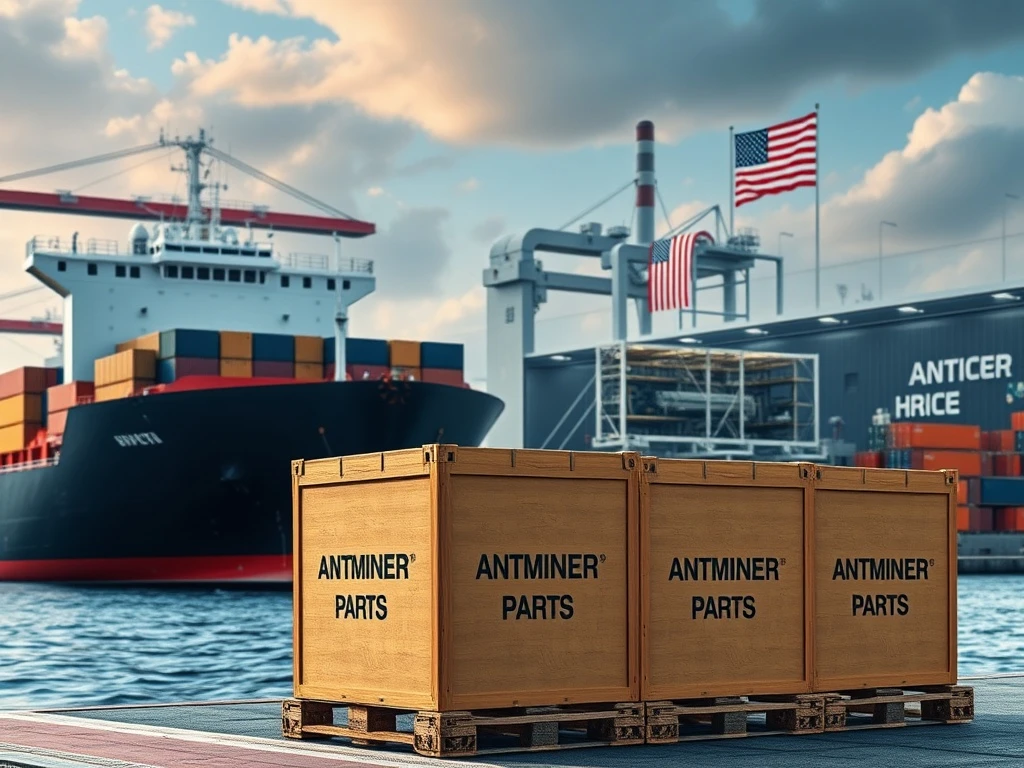Strategic Shift: Bitmain’s Bold Move to US Assembly for Antminer Parts

In the dynamic world of cryptocurrency, strategic maneuvers are key to survival and success. For anyone invested in the future of digital assets, especially those involved in Bitcoin mining, recent developments from industry giant Bitmain are sending ripples. The company, a powerhouse in Bitcoin mining hardware manufacturing, has made a significant logistical pivot, channeling an astounding 187,000 kilograms of Antminer electronic components into the U.S. This isn’t just about moving parts; it’s a calculated move to sidestep potential tariffs and embrace localized assembly, a decision with profound implications for the entire sector.
Bitmain’s Strategic Pivot: Why US Assembly Now?
The core of Bitmain‘s latest strategy lies in its collaboration with Cango Inc., a newly listed entity on the New York Stock Exchange. Shipment records reveal that this massive volume of Antminer components is being routed through Cango, signaling a deliberate effort to bypass tariffs that could significantly inflate the cost of Chinese-made products. Instead of shipping fully built machines, Bitmain is now sending components to a Delaware-based affiliate for domestic assembly. This marks a notable departure from previous practices and underscores a proactive approach to mitigating trade policy risks.
This logistical overhaul, which began in June 2025, isn’t an isolated incident. It’s part of Bitmain’s broader strategy to navigate market volatility and efficiently manage its extensive inventory. Since 2023, the company has been redirecting over 50 EH/s of unsold Antminer S19XP units from Southeast Asia to a Georgia subsidiary. These units are now consolidated under Cango’s balance sheet, highlighting Cango’s crucial role as a proxy for inventory management. This centralization allows Bitmain flexible reallocation of assets, especially pertinent in a landscape marked by declining demand post-halving.
Navigating Trade Winds: How Tariffs Drive Innovation
The threat of potential tariffs, particularly those proposed by the Trump administration on Chinese electronics, is a major catalyst behind Bitmain’s shift. By assembling components within the U.S., Bitmain effectively insulates itself from these financial risks. This defensive maneuver against trade uncertainties isn’t unique to Bitmain; it’s a growing trend across the industry as companies seek to mitigate geopolitical risks and complex regulatory landscapes.
Beyond tariff avoidance, localized assembly offers several compelling advantages:
- Cost Efficiency: Reduces the financial burden of import duties.
- Operational Agility: Allows for quicker adjustments to production volumes based on market fluctuations and demand.
- Supply Chain Resilience: Decreases dependency on long, vulnerable international supply chains.
- Regulatory Compliance: Aligns with increasing calls for domestic production and reduces cross-border trade complexities.
This move isn’t just about avoiding taxes; it’s about building a more robust and responsive business model in a rapidly evolving global economy.
The Antminer Advantage: Optimizing Supply Chains and Inventory
The Antminer series has long been synonymous with high-performance Bitcoin mining. Bitmain’s strategic use of U.S. subsidiaries for cost management and inventory optimization is not a new concept for the company. In 2023, Bitmain repurposed surplus miners for internal mining operations, demonstrating a consistent focus on optimizing its assets. The current collaboration with Cango takes this a step further, leveraging a third party for more dynamic inventory control.
This centralization under Cango allows Bitmain to:
- Reallocate Assets Flexibly: Quickly move inventory to where demand is highest or where it can be most efficiently utilized.
- Buffer Against Market Swings: Absorb excess supply during periods of low demand, such as those experienced post-Bitcoin halving events.
- Enhance Transparency: While Cango acts as a proxy, it streamlines the inventory tracking and management process.
This sophisticated approach to supply chain management is crucial for maintaining competitiveness in a volatile market.
Beyond Bitmain: The Future of Bitcoin Mining Hardware
The broader Bitcoin mining hardware sector is undergoing a significant transformation. As global demand for mining equipment stabilizes, firms are increasingly prioritizing domestic production. This trend is driven by a desire to comply with evolving regulations and reduce dependencies on complex, cross-border trade networks. Competitors like MicroBT have already adopted similar strategies, partnering with U.S. manufacturers to assemble imported parts, signaling a widespread industry shift.
Bitmain’s collaboration with Cango serves as a prime example of how leading manufacturers are adapting to these challenges. By leveraging proxies for inventory management and embracing localized assembly, companies aim to strike a delicate balance between regulatory compliance and cost efficiency. This approach is becoming the new standard in an increasingly fragmented and unpredictable global market. The long-term implications for miner availability, pricing, and overall market stability are significant, potentially leading to more resilient and localized mining infrastructure globally.
Bitmain’s bold move to shift its Antminer parts for U.S. assembly is more than just a logistical change; it’s a strategic masterstroke in navigating the choppy waters of global trade and volatile crypto markets. By proactively addressing potential tariffs and optimizing its supply chain through localized production and clever inventory management, Bitmain is not only protecting its bottom line but also setting a precedent for the entire Bitcoin mining hardware industry. This strategic pivot highlights a broader industry trend towards greater resilience and adaptability, ensuring that the wheels of decentralized finance keep turning, come what may.
Frequently Asked Questions (FAQs)
Q1: Why is Bitmain shipping parts instead of fully assembled Antminers to the U.S.?
Bitmain is shipping components for local assembly in the U.S. primarily to avoid potential tariffs on fully manufactured Chinese-made products. By assembling the Antminer units domestically, they can bypass these import duties, which helps reduce costs and enhance operational flexibility in response to trade policies.
Q2: What is Cango Inc.’s role in Bitmain’s new strategy?
Cango Inc., a newly listed NYSE entity, acts as a logistical and inventory management proxy for Bitmain. The 187,000 kg of Antminer components are channeled through Cango, and surplus Antminer S19XP units are consolidated under Cango’s balance sheet. This arrangement allows Bitmain to flexibly reallocate assets and manage inventory more efficiently, especially amid declining demand post-halving.
Q3: How does this shift impact the Bitcoin mining hardware market?
This shift signifies a broader industry trend towards localized production to mitigate geopolitical risks and regulatory complexities. It can lead to more stable supply chains for Bitcoin mining hardware within the U.S., potentially influencing pricing and availability for domestic buyers. It also encourages other manufacturers to adopt similar strategies for resilience.
Q4: Are other companies in the Bitcoin mining hardware sector adopting similar strategies?
Yes, the article mentions that competitors like MicroBT have also adopted similar strategies, partnering with U.S. manufacturers to assemble imported parts. This indicates a growing industry-wide recognition of the benefits of domestic production for navigating trade uncertainties and optimizing supply chains.
Q5: What does ‘post-halving demand decline’ refer to?
‘Post-halving demand decline’ refers to the period after a Bitcoin halving event, where the reward for mining new blocks is cut in half. This often leads to a decrease in profitability for some miners, which in turn can reduce demand for new Bitcoin mining hardware as less efficient operations become unprofitable. Bitmain’s strategy helps them manage surplus inventory during such periods.









